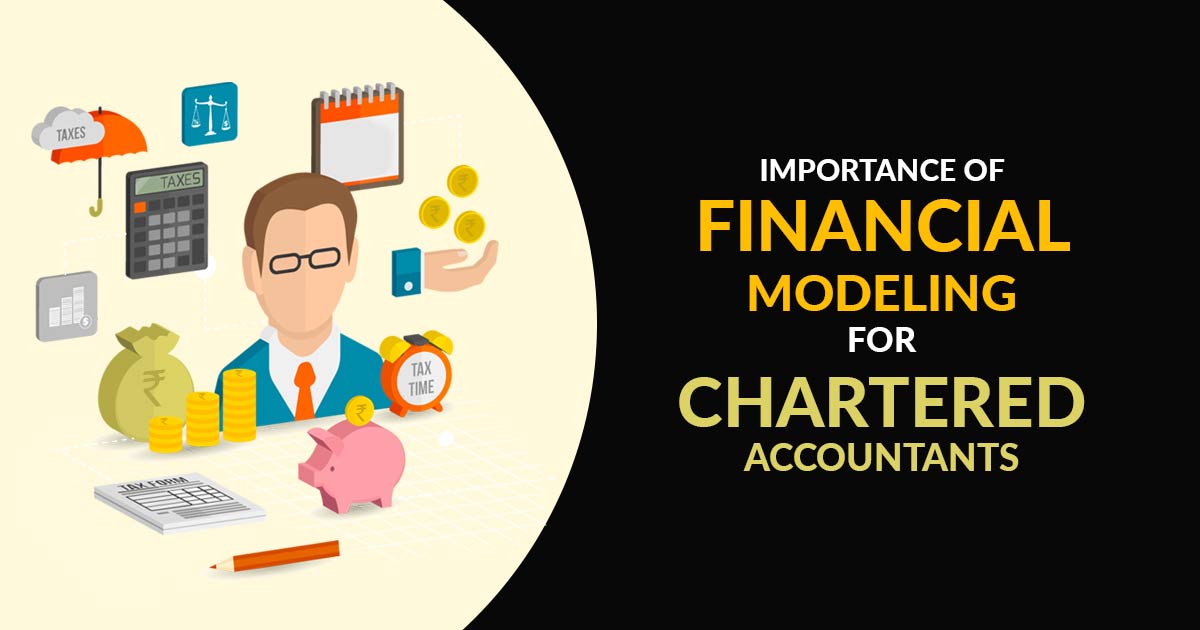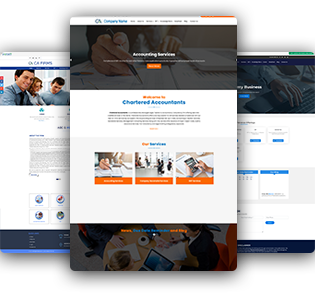
Chartered Accountants (CAs) in the current fast-paced business world play a significant role that proceeds more than just maintaining financial records. Under the amended responsibilities, understanding how to make and use the financial models has become crucial. Chartered Accountants have been authorized under financial modelling to look closely at the financial details, foresee future trends, and propose valuable strategic information that extends beyond typical accounting obligations. The article discusses the key reasons why every CA must acknowledge learning financial modelling to enhance their skills and stay competitive in the financial field.
Chartered Accountants attract a lot of reverence from those in and around them. And why shouldn’t they?… The demanding and gruelling hours endured by an aspirant to earn the coveted chartered accountant qualification notwithstanding the ever growing competition deserve all the accolades and the financial status that is showered on him/her post his/her initiation as a professionally qualified CA.
Why Do You Understand Financial Modelling?
A financial model is referred to as the tool that has been utilised to understand an organisation’s attributes over the passing years ( or other time frames). Also, it aids in forecasting the financial performance into the future. This financial model is made on MS- Excel, it is completely possible to do it manually even if it is practised on a small scale. Therefore the procedure of making this is known as financial modelling.
The prominent parts of a well-devised financial model are the Income statement, cash flow statement, and Balance sheet. Company executives, financial analysts, portfolio managers, investors, and so on are the areas where financial modelling is widely used for understanding the performance of organisations. However, there are some fields like Budgeting and raising capital. Investments and Valuations required a wide encounter with financial models.
However, a prominent skill that would equip modern day CAs to stay above the increasing herd and carve out a successful career for themselves in the ever-changing landscape of the corporate world is Financial Modeling.
Free DEMO for Tax and Accounting Websites for Your Firm
Top Reasons Why CA Need Financial Modeling:
CAs must consider financial modelling as it allows them to furnish precise information and drive better business decisions. Financial Modeling could add important feathers to a Chartered Accountant’s skill set due to the reasons listed below:
#1. A Research-Oriented Mind Set
Chartered Accountancy is often criticised for its monotonous nature. With time, Chartered Accountants who are adept at accounting firms and taxation tend to get a bit mechanical in their work routine.
However financial modelling trains them to read beyond the financial statements. It empowers them to make calculated assumptions and predictions about future trends, investment returns etc. Forecasts backed by data gathered over a considerable period are the need of the hour. Financial modelling trains Chartered Accountants to develop an analytical mindset which is equivalent to gold in the technology-driven fields of 21st-century investment banking, equity research, and financial analysis.
#2. A Step-Ahead in The Rat Race
Survival of the fittest is the universal truth that pervades the corporate sector. There are now digital solutions powered by strong software that can easily perform yesteryear tasks that require the services of a Chartered accountant.
Chartered Accountants with their expertise remain welcome professionals across a wide spectrum of the finance world like mergers & Acquisition Analysis, Investment Banking, Equity Research, Corporate Finance etc. However, with Artificial Intelligence and Machine Learning Models set to reinvent the employment landscape across the blue planet, Financial modelling will empower Chartered Accountants to acquire these skills and stand out among industry competitors like MBAs, CFAs, and CIMA graduates who are strong contenders for research-oriented roles.
#3. Power Combo of Accounting Knowledge and Financial Modeling
Financial Modeling is not just limited to making assumptions and forecasting. It subsumes a wide plethora of skills like Excel proficiency, VBA, basics of coding, qualitative knowledge about the industry and the company, valuation methodologies, and ratio analysis.
Some of the other skills that financial modelling teaches include:
- Building a logical framework for problem-solving
- Breaking down large and unorganized datasets into a simple yet logical format.
- Drawing valuable insights from periodical data.
- Formulation of corporate strategies.
- Apt and Clear presentation skills with a panache for storytelling.
#4. Chartered Accountants: The Modern Day Explorers
The job description of a chartered accountant is not just limited to Accounting, Auditing, and Taxation anymore. With changing times, modern-day CA’s are willing to explore new horizons in areas of research, analysis, project finance management, forex analysis etc.
In addition to the lower passing percentage of chartered accountancy exams, the challenges and exposure to lucrative compensation in these profiles a major driving factors for most modern day aspirants as well as professional CAs to break stereotypes and carve out a fulfilling and successful career for themselves.
#5. No Time To Lose
Ask a CA, “What is TIME?” and most of them would say “Time is pure gold”.
An abstract analogy though, resonates perfectly with the rapidly changing world of Finance. A CA takes years in the making. These years are marked by hard work, persistence and the ability to face failures.
On the other hand, a career move to the investment banking and equity research industry bypassing the rigorous CFA qualification exam is not a child’s play. Upon clearing the final hurdle of their CA exam, most budding CA professionals would prefer to start their career in analytics and research right away rather than go through the rigorous and mandatory four-year curriculum for being a certified Chartered Financial Analyst.
An ideal alternative in this regard would be to pursue a short-term certificate course in Financial modelling from a reputed industry body. This would give them the skill, confidence and platform to launch themselves into research-oriented roles.
Unchartered Territories
“Two roads diverged in a wood and I took the one less traveled and that has made all the difference” ~ Robert Frost
The above words perfectly express the learning and opportunities that finance modelling will open up for CA professionals.
Some of them are:
Equity Research:
Stock Markets are the engines that power the modern economy. FM imparts the necessary skills to research listed stocks and minutely analyze investment options. The skillset is always in high demand to prepare a smart investment portfolio for clients.
Mergers & Acquisitions:
Mergers and Acquisitions are part and parcel of the modern corporate world. However, a legal and hassle-free merger demands a few important checkpoints that require the services of an expert in Financial Modeling.
These include:
- Correct Valuation of Participating Companies.
- Evaluating Synergy Benefits.
- Revenue Forecasts
- In-depth analysis of the Competitor’s objective and possible takeaways from the negotiation table.
Investment Banking:
A pre-requisite for an Investment banker is mastery of Excel or spreadsheets. It is an ideal tool for Investment Bankers to forecast revenues, make appropriate investment decisions, etc.
Corporate Finance:
Most high stake Corporate decisions take into account MIS reports. MIS reports are the basis for monitoring and evaluating financial performance. This better equips the management while considering the viability of any investment/project. Most organizations adhere to a standardized model for MIS reporting. FM aids in sustaining a flexible reporting model with minimum errors.
Career Opportunities for Qualified CA’s And Aspirants
When it is Financial modelling, generally we look into the CA career options and growth opportunities with the more widely used tools. These can be investment banking (portfolio management, stock selection, etc) Corporate development ( valuation, comparison, etc), equity research (acquisitions & mergers, fundamentals analysis, etc), financial planning & analysis (FP&A), and accounting (transaction advisory, due diligence, etc).
The parameters of financial modelling applications are extensive and the reason why models are utilised for an expanded range. These include decision-making involving those related to mergers, acquisitions, internal planning, capital raising, forecasting, budgeting, valuations, and investments. Additionally, the scopes will be enhanced once you start looking at ad-hoc analysis, scenario analysis, sensitivity analysis, capital projects, return on investment, and IRRR. The activities are practised by experts in investment banking, private equity, corporate development, financial planning & analysis(FP&A), and equity research.
Here is the list of organisations that have wide use of financial modelling –
- Financial Services
- Domestic Majors
- Global Firms
- Private Equity
- Boutique firms
- Domestic Brokerages
- Asset Management
- Other Corporates
Conclusion
we can say that Financial Modeling opens up doors of opportunities and challenges in the mundane job description of a Traditional Chartered Accountant.
Besides, the rapidly evolving IT services powered by the services of better and more powerful artificial intelligence can take anybody’s food off the table within the blink of an eye. In these changing times, Finance Modeling opens up new uncharted territories for middle age experienced professionals and in particular “The Chartered Accountants”.








